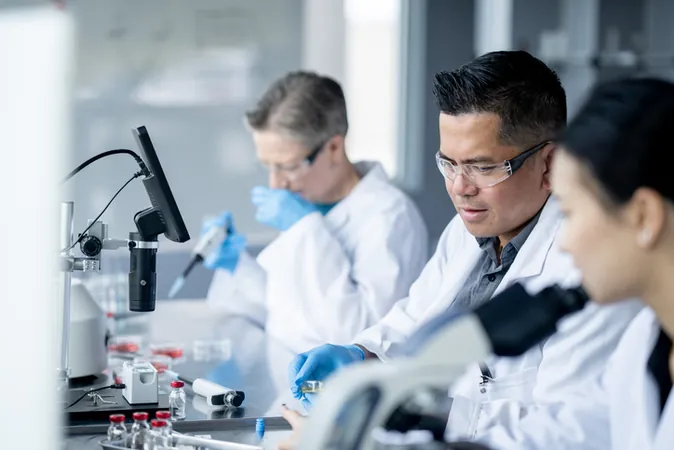
Revolutionary Synthetic Biosensor Changes the Game in Drug Monitoring!
2025-05-28
Author: Rajesh
Unveiling a Breakthrough in Medical Technology
Imagine a world where our bodies are equipped with a technology that continuously monitors our health status, optimizing drug delivery and spotting diseases like cancer early on. For over twenty years, researchers have chased this vision, developing biosensors capable of detecting chemical reactions inside us and relaying data outside our bodies. While existing biosensors can identify minute molecules like drugs in real time, they usually operate only for a limited period, leaving a crucial gap in long-term health monitoring.
Meet SENSBIT: The Next-Generation Biosensor!
In an exciting breakthrough, Stanford University researchers, inspired by the human gut, have engineered a game-changing biosensor called the Stable Electrochemical Nanostructured Sensor for Blood In situ Tracking (SENSBIT). This cutting-edge system has demonstrated the remarkable ability to function for up to a week when implanted directly into the blood vessels of live rats. SENSBIT is not just a temporary solution; it can continuously track drug concentrations, proving its efficiency in both live animal models and human serum.
Lead researcher Tom Soh, a professor in the fields of electrical engineering, bioengineering, and radiology, proudly stated, “This order-of-magnitude improvement in whole-blood sensor longevity over existing technologies marks a significant leap toward next-generation biosensors.”
A Design Inspired by Nature's Genius
The biosensor promises a bright future for medical technologies. Their groundbreaking paper published in Nature Biomedical Engineering reveals that SENSBIT provides a generic design foundation for sensors capable of extended in vivo operation. By mimicking the human gut's protective mechanisms, the researchers created a synthetic biosensor that continuously detects crucial target molecules.
While conventional blood tests are usually limited to single-time-point measurements, the biosensor could revolutionize patient monitoring by providing real-time data on drug dosing, disease tracking, and metabolic activity.
Overcoming Challenges in Blood Monitoring
Despite the promising advancements in biosensor technology, achieving long-term detection in the bloodstream has been fraught with challenges. Issues like probe degradation and signal interference have hindered progress. Over a decade, researchers in Soh’s lab designed a unique molecular switch that binds to target molecules, emitting a readable signal. However, the body’s immune response often threatened the lifespan of these sensors.
SENSBIT's Ingenious Design Enhances Durability
To tackle this problem, PhD candidate Yihang Chen and his team turned to biology for solutions. They crafted the SENSBIT system to replicate the protective attributes of intestinal mucosa, with a nanoporous gold surface that protects sensitive elements from harmful substances while a special coating adds an extra layer of defense against degradation.
In laboratory tests, the SENSBIT system retained over 70% of its signal after a month in human serum and more than 60% after a week in live rat blood vessels, far surpassing previous attempts that lasted only a few hours.
A Game-Changer for Continuous Health Monitoring
The implications of the SENSBIT system are staggering. Imagine real-time monitoring that could alert us to infections before symptoms emerge or facilitate personalized treatment plans. By capturing our body’s responses to various stimuli, SENSBIT could help us understand and tackle health issues proactively.
Despite its challenges, SENSBIT represents a significant step towards implantable biosensors. The research team believes it sets the stage for personalized medicine and advances in health monitoring, creating a future where disease detection is both timely and efficient. Aiming to push the boundaries further, Chen concludes, “This work lays the foundation for a new era in medical technology.”

 Brasil (PT)
Brasil (PT)
 Canada (EN)
Canada (EN)
 Chile (ES)
Chile (ES)
 Česko (CS)
Česko (CS)
 대한민국 (KO)
대한민국 (KO)
 España (ES)
España (ES)
 France (FR)
France (FR)
 Hong Kong (EN)
Hong Kong (EN)
 Italia (IT)
Italia (IT)
 日本 (JA)
日本 (JA)
 Magyarország (HU)
Magyarország (HU)
 Norge (NO)
Norge (NO)
 Polska (PL)
Polska (PL)
 Schweiz (DE)
Schweiz (DE)
 Singapore (EN)
Singapore (EN)
 Sverige (SV)
Sverige (SV)
 Suomi (FI)
Suomi (FI)
 Türkiye (TR)
Türkiye (TR)
 الإمارات العربية المتحدة (AR)
الإمارات العربية المتحدة (AR)